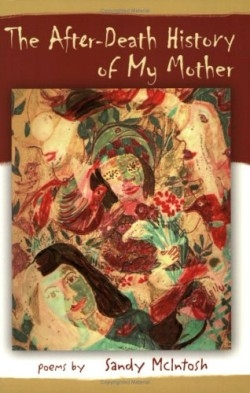
The After-Death History of My Mother
The first poem of this collection ends with the line “Hence, my confusion,” a witty rejoinder to the prose poem that contains it and an apt introduction to everything that follows. As the title suggests, the poet’s quest is familial, but it is also poetic. In a way, the poetic mentors McIntosh invokes (such as Allen Ginsberg and David Ignatow) are like fathers, or at least older brothers, to him. A sort of detective, McIntosh uses whatever tools are available to shed light on his family and poetic pasts.
Form seems a secondary consideration to content. This collection contains prose, dialogue, sketches, citations, and even a few poems with traditional-looking line breaks. If it were not for the helpful subtitle “poems by Sandy McIntosh,” this book could be easily miss-shelved. The innovation of this work is most apparent when McIntosh combines as many methods as possible into one piece, such as in “Obsessional.” This long poem recounts a graduate student’s enthusiasm for proving that the printer Richard Tottel fiddled with the poems he printed in his wildly popular Songs and Sonnets. The student tries to illustrate the significance of such a discovery to a classmate: “I plead, / ‘Don’t you see that Tottel snatched / real English poetry, replacing / it with counterfeit? / Verse that sounds like nothing / anyone ever / spontaneously said?’ // Silence.” McIntosh’s enthusiasm for poetry that sounds like natural speech is apparent throughout this volume.
Part of that natural speech is humor, and McIntosh welcomes absurdity: a professor whose research in lawn-mowing methods leads to his wife’s adultery, or a cemetery presented as a chessboard. Jokes often contain grains of truth, and McIntosh’s humor is no exception. However, this collection is no kinder to its readers than to its speakers whose quests for understanding are not realized in these pages. This collection is more about the challenges of discovery.
McIntosh’s embrace of multiple forms is not surprising; he is the managing editor of Confrontation, Long Island University’s national literary magazine, which publishes poetry, fiction, essays, and drama. McIntosh’s publication credits include essays in The Wall Street Journal and The New York Times, as well as multiple books of poetry and prose. It is not only McIntosh’s work that is on display in The After-Death History of My Mother; works of American artist Rose Graubart Ignatow (1914—1995) grace multiple pages and the cover. This embrace of Ignatow’s work emphasizes McIntosh’s respect for multiple types of artistic exploration, an exploration certainly not limited to traditional poetry.
Reviewed by
Erica Wright
Disclosure: This article is not an endorsement, but a review. The publisher of this book provided free copies of the book to have their book reviewed by a professional reviewer. No fee was paid by the publisher for this review. Foreword Reviews only recommends books that we love. Foreword Magazine, Inc. is disclosing this in accordance with the Federal Trade Commission’s 16 CFR, Part 255.
